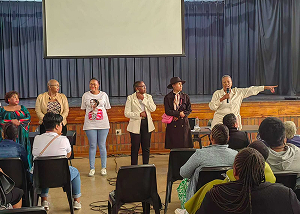Introduction
On the 7th of October 2025, a pivotal meeting on Collaborative Community on Place-based Leadership was hosted by Synergos at the Red Radisson Hotel in Rosebank, Johannesburg, South Africa.
The event brought together esteemed representatives from various organizations, including the Tabo Mbeki Foundation, Graca Machel Trust, Public Affairs Research Institute (PARI), and KAGISO Trust, among others. Mr. Rex Molefe, Director of Motheo Training Institute Trust, led the discussion, accompanied by Ms. Palesa Tyatyi, Chief Operation Officer, advocating for systemic change and systems thinking in local governance.
This article encapsulates the key arguments presented by Mr. Rex Molefe emphasising the interplay between municipal legislation, collaborative governance models, leadership characteristics, and community engagement.
The Legislative Foundation of Municipal Governance
Mr. Molefe highlighted ten critical legislations governing municipalities in South Africa, underscoring their importance in shaping effective governance and service delivery:
1. Constitution of the Republic of South Africa (Chapter 7, Sections 151-164):
Outlines municipal status, objects, powers, and functions, ensuring democratic governance.
2. Municipal Structures Act (117 of 1998):
Defines municipal categories, structures, and office-bearers.
3. Municipal Systems Act (32 of 2000):
Emphasises integrated development plans, performance management, and community participation.
4. Municipal Finance Management Act (56 of 2003):
Ensures sound financial management and transparency.
5. Municipal Property Rates Act (6 of 2004):
Regulates property taxation for local development.
6. Organised Local Government Act (52 of 1997):
Recognises municipal representative organizations.
7. Municipal Demarcation Act (27 of 1998):
Establishes criteria for municipal boundaries.
8. Municipal Electoral Act (27 of 2000):
Regulates democratic municipal elections.
9. Intergovernmental Relations Framework Act (13 of 2005):
Promotes national, provincial, and local government cooperation.
10. Municipal Fiscal Powers and Functions Act (12 of 2007):
Aligns municipal fiscal powers with national objectives.
Mr. Molefe stressed that many deployed officials lack familiarity with these legislations, hindering their ability to discharge responsibilities effectively and compromising service delivery.
Furthermore, communities’ limited awareness of these laws impedes their capacity to hold municipalities accountable.
Collaborative Governance: Models and Leadership
The presentation delved into collaborative governance models, which bring together multiple stakeholders—government agencies, community organisations, businesses, and individuals—to address public issues and make inclusive decisions.
Key characteristics include multi-stakeholder engagement, shared decision-making, collaborative leadership, mutual trust, clear goals, and participatory processes. Examples encompass Public-Private Partnerships (PPPs), community-based planning, multi-stakeholder initiatives (MSIs), co-management arrangements, and participatory budgeting.
Effective collaboration hinges on leadership embodying traits such as empathy, transparency, vulnerability, inclusivity, flexibility, accountability, empowerment, authenticity, curiosity, and appreciation.
These characteristics foster trust, facilitate cooperation, and create an inclusive environment conducive to community development.
Community Engagement and Citizenry
Citizenry—the collective body of citizens with rights, responsibilities, and a sense of belonging—plays a pivotal role in collaborative governance.
Active participation, engagement, and contribution to societal well-being are crucial.
Grassroots movements, voter turnout drives, and community solidarity exemplify citizenry in action, balancing individual freedoms with communal responsibilities. This is what Mr. Rex Molefe presented.
Insights from Distinguished Guests
Cirish Daya from PARI discussed the Local Government Collaboration Model, emphasising intergovernmental coordination and stakeholder engagement.
Representatives from the Thabo Mbeki Foundation and Graca Machel Trust contributed perspectives on leveraging collaboration for impactful local governance and development.
Commitment of Motheo Training Institute Trust
Motheo Training Institute Trust reaffirmed its dedication to advocating for systemic change and systems thinking in municipal governance.
Through initiatives like this meeting, the Motheo Training Institute Trust seeks to enhance awareness, build capacity, and foster collaboration, ultimately strengthening service delivery and community empowerment.
Conclusion
The collaborative community on place-based leadership underscores the necessity of integrating legislative knowledge, collaborative governance models, effective leadership, and active citizenry.
As South Africa continues to navigate local governance challenges, stakeholders must align efforts, leveraging these elements to drive impactful, sustainable change.
The commitment of Motheo Training Institute Trust, alongside partners like Synergos, Tabo Mbeki Foundation, Graca Machel Trust, PARI, and KAGISO Trust, signals a promising trajectory toward empowered, inclusive, and effective municipal service delivery.
Attendees
– Mr. Rex Molefe, Director, Motheo Training Institute Trust
– Ms. Palesa Tyatyi, Chief Operation Officer, Motheo Training Institute Trust
– Representatives from:
– Thabo Mbeki Foundation
– Graca Machel Trust
– Public Affairs Research Institute (PARI)
– KAGISO Trust
– Host Organization: Synergos and
– Many other Stakeholders
– Venue: Red Radisson Hotel, Rosebank, Johannesburg, South Africa.
Rex Molefe
(The Director of Motheo Training Institute Trust)





